 This Gun for Hire (McKenna Brothers, #1) by Jo Goodman
This Gun for Hire (McKenna Brothers, #1) by Jo Goodman Formats available: paperback, ebook, large print
Series: McKenna Brothers #1
Pages: 361
Published by Berkley on April 7th 2015
Purchasing Info: Author's Website, Publisher's Website, Amazon, Barnes & Noble, Kobo, Bookshop.org
Goodreads
Jo Goodman, a premier writer of western romance and the author of In Want of a Wife, is back with a sensational new novel for fans of Linda Lael Miller and Joan Johnston. He’s got a job to do…Former army cavalryman Quill McKenna takes pride in protecting the most powerful man in Stonechurch, Colorado: Mr. Ramsey Stonechurch himself. But the mine owner has enemies, and after several threats on his life, mines, and family, Quill decides to hire someone to help guard the boss’s daughter. Only problem is the uncontrollable attraction he feels toward the fiery-haired woman who takes the job. …but she’s a piece of work. Calico Nash has more knowledge of scouting and shooting than cross-stitching, but she agrees to pose as Ann’s private tutor while protecting her. But between her growing attraction to Quill and the escalating threats against the Stonechurches, Calico will soon have a choice to make—hang on to her hard-won independence or put her faith in Quill to create the kind of happy ending she never imagined…
My Review:
When I saw this title, I assumed, as one does, that the gun that was for hire was attached to a guy. However, that is marvelously not so, and is only the first of many wonderful surprises in this trope-bending western romance.
This is also a scenario that I’ve seen before, but by moving it to a historical western setting, it makes a lot of the normally tried-and-true tropes fresh and new. Calico Nash is, first and foremost, an original, and it is her story and her unexpected point of view that make it so much fun.
While we generally think of bounty hunters and security agents in the “Wild West” as having been men, there’s no logical reason why some couldn’t have been women. Certainly, the first female Pinkerton Agent, Kate Warne, precedes the setting of This Gun For Hire by a couple of decades. So Calico Nash, while not likely, is certainly plausible enough to make this story interesting without tripping the willing suspension of disbelief.
When Calico Nash and Quill McKenna first meet in a whorehouse, neither of them is exactly what they seem. And while both of them seem more than competent at dealing with a bunch of villains, they also both seem not to like each other much.
Looks, as they say, can be deceiving.
So when Quill needs to find a way to protect the daughter of the man he is body-guarding, Calico is the first and only solution that comes to mind. He knows she can protect Ann Stonechurch, and he knows that Calico can pretend to be anything she needs to be to make her surreptitious protection effective.
He also knows that he wants to see Calico again, whether he is fully admitting that to himself or not.
So while Quill is guarding mining baron Ramsey Stonechurch by pretending to be just his lawyer, Calico protects Ann by pretending to be her teacher. And both Quill and Calico pretend that their inevitable liaison is just due to propinquity and shared danger, and has no deeper feelings involved.
Calico also tries to pretend that she has no deeper feelings that could be involved. Not just because it’s never happened before, but because she never believed it could happen to her at all.
Meanwhile, both Quill and Calico are forced to pull their charges out of danger, over and over again. Ramsey Stonechurch is being threatened by person or persons unknown, who seem to be interested in either unionizing his miners or creating a more ‘equitable” distribution of profits between the mining baron and his employees.
Ann Stonechurch is being threatened purely as a way to rattle her father. And it’s working.
But while Quill and Calico are busy looking for outside threats, they overlook the proverbial viper in the family’s bosom. And no one expects that the villains they thwarted all the way back in Act 1 could possibly make common cause with the one they face at the mine.
It’s a mistake that could cost them their lives.
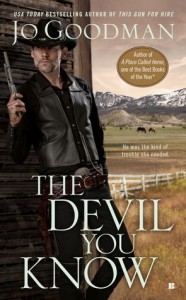 Escape Rating A-: I picked this up because so many of my fellow book addicts over at The Book Pushers absolutely raved about it. I wanted to get in on today’s joint review of the followup book, The Devil You Know, and I just couldn’t go there without reading the first book first.
Escape Rating A-: I picked this up because so many of my fellow book addicts over at The Book Pushers absolutely raved about it. I wanted to get in on today’s joint review of the followup book, The Devil You Know, and I just couldn’t go there without reading the first book first.
Not that each book doesn’t stand perfectly well on its own, but it was so much fun to read them back to back. The Old West probably wasn’t ever like this for women, but dagnabbit, it should have been.
Calico is just a terrific heroine. She became a bounty hunter and security guard because she both worshiped her father and tried to live up to his image. Badger Nash was a bounty hunter and scout for the U.S. Army, and he taught his daughter everything he knew – which was a heck of a lot. When he died on the trail, she finished up his last job for him, took the reward money, and never looked back.
Calico’s knowledge of what women usually do in the “Wild West” comes from two nearly contradictory resources – the Army wives who manipulate and dissect life in remote Army postings, and the whorehouse where Quill finds her handling security. She knows what hides behind civilized behavior, and she’s pretty cynical about the roles that women are supposed to play. She can fake it if she has to, but she’s never going to be anyone other than who she is.
And she’s become almost as much of a legend as Annie Oakley or Calamity Jane.
The irony in the relationship that blossoms between Calico and Quill is that Calico never pretends with Quill. He always sees her exactly as she is. She may dissemble in front of others, but with him she is always her authentic self. Quill, on the other hand, is hiding layers within layers from the beginning of the story until very nearly the end.
This is also a story where much of the romance occurs in, and is punctuated with, intelligent banter. These two fall in love because they “get” each other, even if that phrase wouldn’t have been used at the time. They spark each other’s best wits, and it is fun to watch.
There is also a suspense element to this story. Quill and Calico are both on the job because there is a threat hanging over the head of Ramsey Stonechurch. Their job is both to protect the family and to figure out where the threat is coming from and eliminate it. Whatever the reader or both Quill and Calico think of Ramsey Stonechurch, his daughter is certainly innocent.
Ramsey Stonechurch is an interesting character himself, because he does not fall into the stereotype. At first we think he must be a typical overbearing robber baron, but first impressions deceive (somewhat) and he is much more nuanced than first appears.
While I sort of figured out who was probably behind some of the threats fairly early on, the author does a good job of concealing means and especially motive until the very end. I knew who it must be, but not the whys or the wherefores. I also couldn’t see this person as being the motivator behind all events, it just didn’t seem likely for most of the story. I kept looking for a bigger evil who just wasn’t there.
Calico’s character makes This Gun for Hire a trip to the “Wild West” as it should have been.

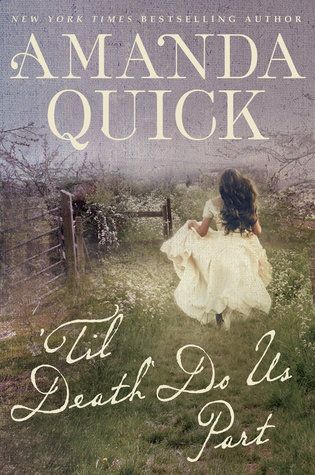 'Til Death Do Us Part by
'Til Death Do Us Part by 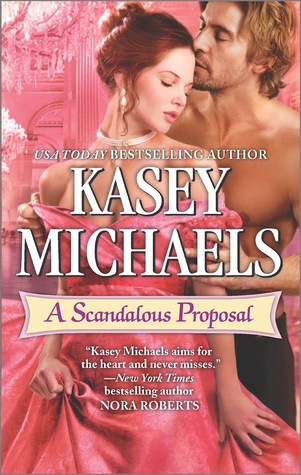 A Scandalous Proposal (The Little Season, #2) by
A Scandalous Proposal (The Little Season, #2) by 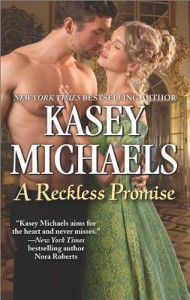 A Scandalous Proposal is the second book in Michaels’
A Scandalous Proposal is the second book in Michaels’ 
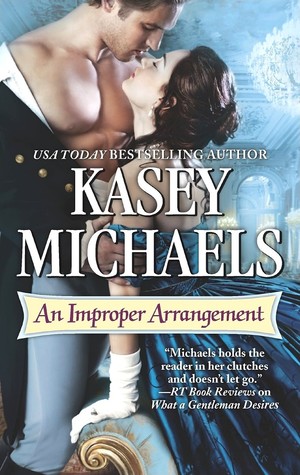 An Improper Arrangement (The Little Season, #1) by
An Improper Arrangement (The Little Season, #1) by  Fall of Poppies: Stories of Love and the Great War by
Fall of Poppies: Stories of Love and the Great War by 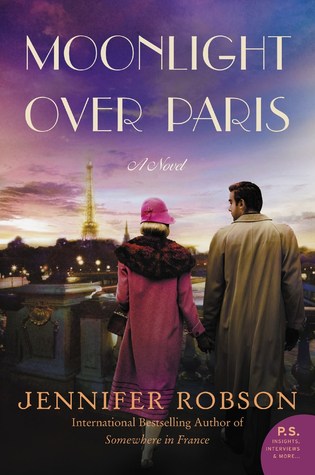 Moonlight over Paris by
Moonlight over Paris by  Moonlight Over Paris is the follow up to the author’s lovely
Moonlight Over Paris is the follow up to the author’s lovely  Escape Rating B+: I enjoyed Moonlight Over Paris, and was just as wrapped up in this story as I was in its predecessors. But Moonlight seems like a smaller and more intimate story than either of the first two books.
Escape Rating B+: I enjoyed Moonlight Over Paris, and was just as wrapped up in this story as I was in its predecessors. But Moonlight seems like a smaller and more intimate story than either of the first two books.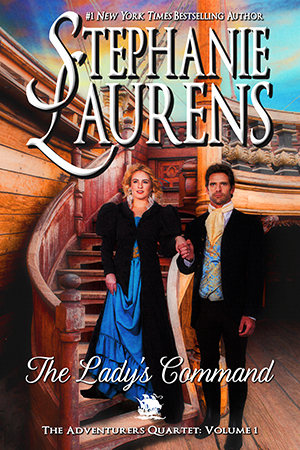 The Lady's Command (The Adventurers Quartet, #1) by
The Lady's Command (The Adventurers Quartet, #1) by  So we see Declan and Edwina establish the future path for their relationship, and the future path for the investigation into what’s going wrong in Freeport. Further steps in the investigation will be someone else’s to discover in the succeeding volumes of
So we see Declan and Edwina establish the future path for their relationship, and the future path for the investigation into what’s going wrong in Freeport. Further steps in the investigation will be someone else’s to discover in the succeeding volumes of  Adrian (The Brotherhood of Fallen Angels, #2) by
Adrian (The Brotherhood of Fallen Angels, #2) by  In the first book in this series,
In the first book in this series, 
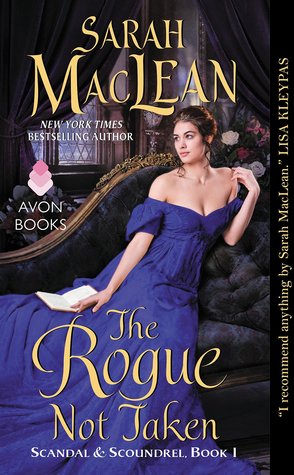 The Rogue Not Taken (Scandal and Scoundrel, #1) by
The Rogue Not Taken (Scandal and Scoundrel, #1) by 

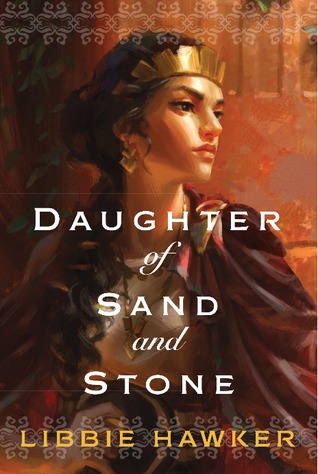 Daughter of Sand and Stone by
Daughter of Sand and Stone by 